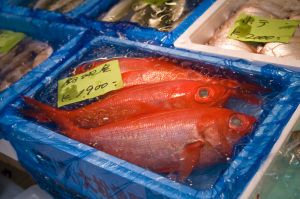In every delicatessen and fruit and vegetable store, EPS is on display, the stacks of brilliantly white trays filled with ice, and the catch of the day, or produce from market gardens.
It's lightweight, water resistance and white colour make EPS perfect for food presentation. But dealing with waste EPS amounts to a dirty great problem and the numbers aren't encouraging.
A 2009 report by Hyder Consulting found that 39,515 tonnes of EPS was consumed in 2008.
In terms of volume, that's 656,000 cubic metres, requiring the equivalent of almost 2.1 million 44-gallon drums to store.
The solution to waste EPS has for a long time been landfill. EPS is chemically inert so there is no risk of soil contamination. But what of recycling?
The Hyder research was commissioned by the Plastics and Chemicals Industry Association (PACIA) for its annual National Plastics Recycling Survey, and funded by taxpayers through state government agencies.
It found that just 2,959 tonnes, or less than 10% of EPS was reprocessed in Australia. This was a big increase on the 1422 tonnes reprocessed locally in 2007, but a mammoth waste problem remains.
One alternative to burying this mountain of fake snow is to use technology to transform it into a new product.
Lismore Council recently installed an Expanded Polystyrene (EPS) recycling machine at Lismore Recycling and Recovery Centre to recycle an anticipated 33 tonnes of polystyrene annually, saving 550 cubic metres of landfill space.
Kevin Trustum at Lismore Council said the technology gave the council a potentially profitable alternative to dumping EPS.
"We are bagging up the recyclate, and at the moment we are stockpiling it until we get enough. We have to get 20 tonnes before we send it away, and we're expecting to do about 32 tonnes per annum," he said.
"We'll either send it straight to Sydney to an EPS processor, or look at putting it in a container out of Brisbane and sending it overseas ourselves."
Lismore council purchased the machine with $43,000 from the Waste and Sustainability Improvement Program (WaSIP) being run by NSW Department of Environment, Climate Change and Water (DECCW).
DECCW director Local Government and Waste Strategy Jane Moxon said the nature of EPS meant it had been difficult to find an ideal solution.
"DECCW has been working with industry for some time to find solutions to EPS disposal and, last year, Sydney Markets became the first company in Australia to invest in a Korean-made SH-150S Expanded Polystyrene (EPS) recycling machine.
"The machine effectively melts the polystyrene on site, compressing it to ratio of 80 to 1, and creating a recyclate that can be reused in the manufacture of other products, such as timber-look picture frames," Moxon explained.
"At the moment this recyclate is sent to China where there is a well established industry for its reuse in large manufacturing processes, but we are continuing to work with industry here to see if we can establish a local industry for the waste product," Moxon said.





